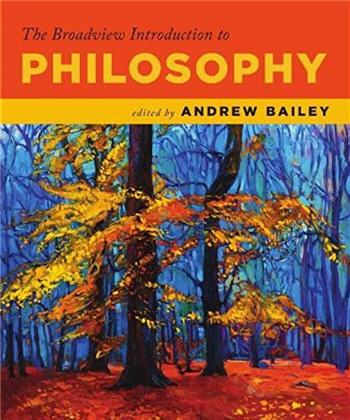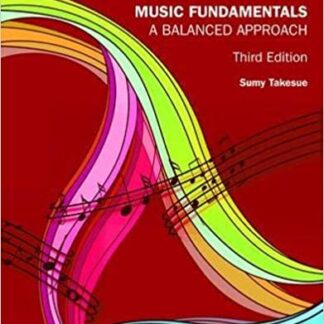Description
The Broadview Introduction to Philosophy by Andrew Bailey, ISBN-13: 978-1554813827
[PDF eBook eTextbook]
- Publisher: Broadview Press (May 21, 2019)
- Language: English
- ISBN-10: 1554813824
- ISBN-13: 978-1554813827
The Broadview Introduction to Philosophy is a comprehensive anthology that surveys core topics in Western philosophy, including philosophy of religion, theories of knowledge, metaphysics, ethics, social-political philosophy, and issues of life, death, and happiness. Unlike other introductory anthologies, the Broadview offers considerable apparatus to assist the student reader in understanding the texts without simply summarizing them. Each selection includes an introduction discussing the context and structure of the primary reading, as well as thorough annotations designed to clarify unfamiliar terms, references, and argument forms. Canonical texts from the history of philosophy are presented alongside contemporary scholarship; women authors are included throughout.
Table of Contents:
Acknowledgments
How to Use This Book
Introduction
What Is Philosophy?
A Brief Introduction to Arguments
Introductory Tips on Reading and Writing Philosophy
PART I: PHILOSOPHY OF RELIGION
Does God Exist?
St. Anselm of Canterbury
Proslogion, Preface and Chapters 2–5; Pro Insipiente (“On Behalf
of the Fool”) by Gaunilo of Marmoutiers; Anselm’s Reply to
Gaunilo
St. Thomas Aquinas
Summa Theologiae, Part I, Question 2: Does God Exist?
David Hume
from Dialogues Concerning Natural Religion
William Paley
from Natural Theology
Gottfried Leibniz
Theodicy: Abridgment of the Argument Reduced to Syllogistic Form
J.L. Mackie
“Evil and Omnipotence”
Marilyn McCord Adams
Horrendous Evils and the Goodness of God
Blaise Pascal
“The Wager,” from Pensées
William K. Clifford
“The Ethics of Belief”
William James
“The Will to Believe”
PART II: THEORY OF KNOWLEDGE
Epistemology
Plato
“The Allegory of the Cave”
René Descartes
Meditations on First Philosophy
John Locke
from An Essay Concerning Human Understanding
Immanuel Kant
from Critique of Pure Reason, Introduction
G.E. Moore
“Proof of an External World”
Edmund L. Gettier
“Is Justified True Belief Knowledge?”
Lorraine Code
“Is the Sex of the Knower Epistemologically Significant?”
Jennifer Saul
“Scepticism and Implicit Bias”
Lee Hester and Jim Cheney
“Truth and Native American Epistemology”
Philosophy of Science
David Hume
from An Enquiry Concerning Human Understanding
Carl Hempel
“Scientific Inquiry: Invention and Test”
Karl Popper
“Science: Conjectures and Refutations”
Thomas Kuhn
“Objectivity, Value Judgment, and Theory Choice”
Helen Longino
“Can There Be a Feminist Science?”
PART III: METAPHYSICS
Philosophy of Mind
Gilbert Ryle
from The Concept of Mind (“Descartes’s Myth”)
Ned Block
from “Troubles with Functionalism”
Thomas Nagel
“What Is It Like to Be a Bat?”
Frank Jackson
from “Epiphenomenal Qualia” and “What Mary Didn’t Know”
David Chalmers
“The Puzzle of Conscious Experience”
Amy Kind
“How to Believe in Qualia”
Free Will
Paul Rée
from The Illusion of Free Will, Chapters 1 and 2
Ishtiyaque Haji
from Incompatibilism’s Allure
A.J. Ayer
“Freedom and Necessity”
Harry G. Frankfurt
“Alternate Possibilities and Moral Responsibility”
P.F. Strawson
“Freedom and Resentment”
Susan Wolf
“Sanity and the Metaphysics of Responsibility”
Personal Identity
John Locke
from An Essay Concerning Human Understanding
Bernard Williams
“The Self and the Future”
Daniel C. Dennett
“Where Am I?”
Derek Parfit
“Personal Identity”
Marya Schechtman
“Experience, Agency, and Personal Identity”
PART IV: ETHICS
Ethical Theory
Plato
from Republic and Euthyphro
Aristotle
from Nicomachean Ethics
Immanuel Kant
from Foundations of the Metaphysics of Morals
John Stuart Mill
from Utilitarianism
Friedrich Nietzsche
from Beyond Good and Evil, Sections 259–261
Virginia Held
“Feminist Transformations of Moral Theory”
Judith Jarvis Thomson
“The Trolley Problem”
Ethical Issues
Abortion
Don Marquis
“Why Abortion Is Immoral”
Judith Jarvis Thomson
“A Defense of Abortion”
Immigration
Christopher Heath Wellman
“Immigration and Freedom of Association”
José Jorge Mendoza
“The Ethics of Immigration Enforcement”
Terrorism
Virginia Held
“Terrorism and War”
Claudia Card
“Recognizing Terrorism”
Non-Human Animals
Peter Singer
“Equality for Animals?”
Mary Midgley
“Is a Dolphin a Person?”
PART V: SOCIAL-POLITICAL PHILOSOPHY
Justice
Aristotle
from Nicomachean Ethics, Book V, Sections 1–5
Thomas Hobbes
from Leviathan, Parts I—II
John Stuart Mill
from On Liberty
Karl Marx and Friedrich Engels
from The Communist Manifesto
John Rawls
from Justice as Fairness: A Restatement
Robert Nozick
from Anarchy, State, and Utopia
Susan Moller Okin
“Justice and Gender”
Equality and Fairness
Mary Wollstonecraft
from A Vindication of the Rights of Woman
Simone de Beauvoir
from The Second Sex, Introduction
Talia Mae Bettcher
“Trans Women and the Meaning of ‘Woman’”
Iris Marion Young
“Five Faces of Oppression”
Kwame Anthony Appiah
“How to Decide If Races Exist”
Ta-Nehisi Coates
from Between the World and Me
PART VI: LIFE, DEATH, AND HAPPINESS
What Is the Meaning of Life?
Epictetus
from Enchiridion
A.J. Ayer
“The Claims of Philosophy”
Jean-Paul Sartre
from Existentialism Is a Humanism
Albert Camus
from The Myth of Sisyphus
Thomas Nagel
“The Absurd”
Kathy Behrendt
“Reasons to Live versus Reasons Not to Die”
Permissions Acknowledgments
Andrew Bailey is Professor of Philosophy and Associate Dean of Arts at the University of Guelph.
What makes us different?
• Instant Download
• Always Competitive Pricing
• 100% Privacy
• FREE Sample Available
• 24-7 LIVE Customer Support




